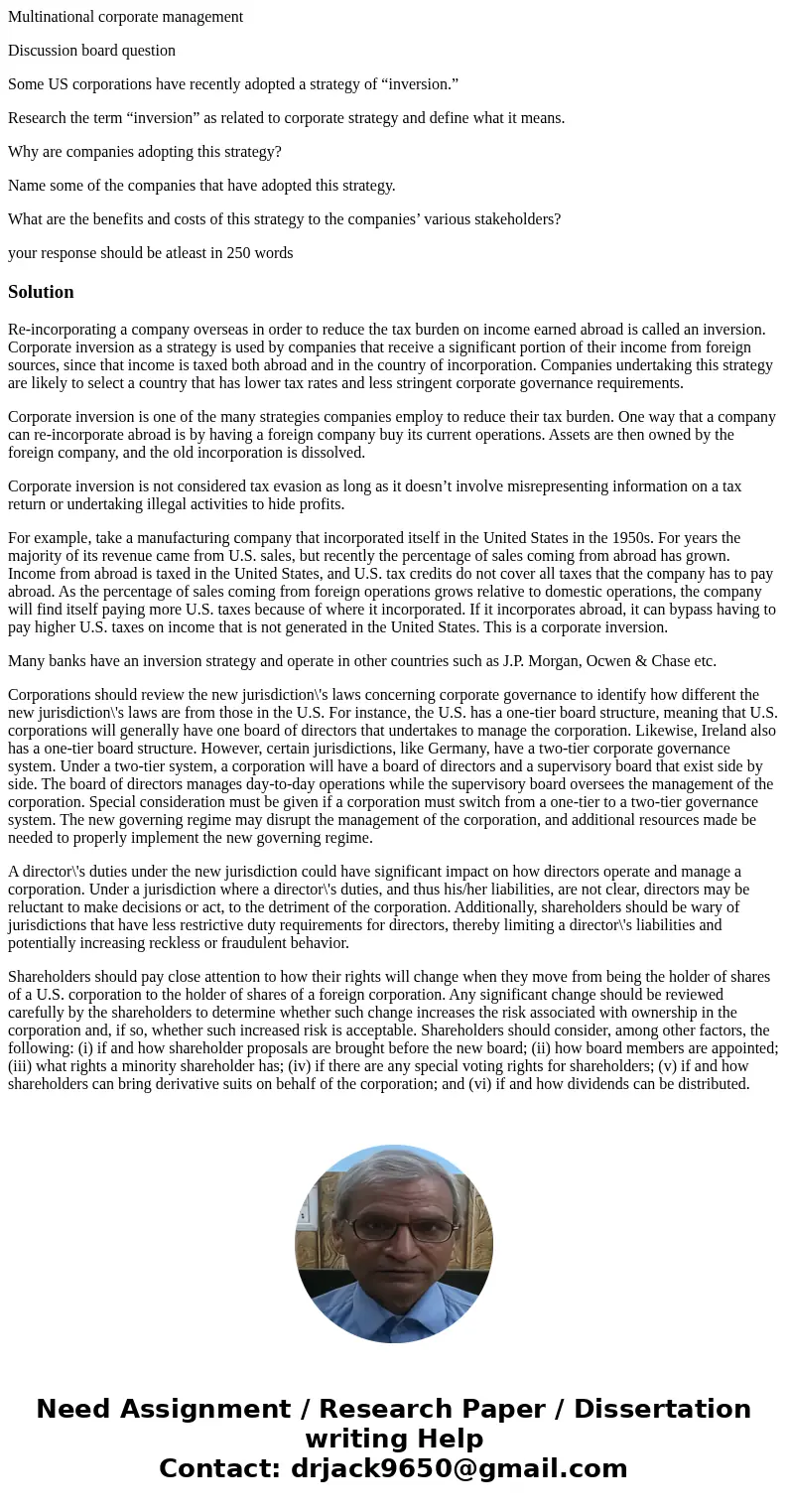Multinational corporate management Discussion board question
Multinational corporate management
Discussion board question
Some US corporations have recently adopted a strategy of “inversion.”
Research the term “inversion” as related to corporate strategy and define what it means.
Why are companies adopting this strategy?
Name some of the companies that have adopted this strategy.
What are the benefits and costs of this strategy to the companies’ various stakeholders?
your response should be atleast in 250 words
Solution
Re-incorporating a company overseas in order to reduce the tax burden on income earned abroad is called an inversion. Corporate inversion as a strategy is used by companies that receive a significant portion of their income from foreign sources, since that income is taxed both abroad and in the country of incorporation. Companies undertaking this strategy are likely to select a country that has lower tax rates and less stringent corporate governance requirements.
Corporate inversion is one of the many strategies companies employ to reduce their tax burden. One way that a company can re-incorporate abroad is by having a foreign company buy its current operations. Assets are then owned by the foreign company, and the old incorporation is dissolved.
Corporate inversion is not considered tax evasion as long as it doesn’t involve misrepresenting information on a tax return or undertaking illegal activities to hide profits.
For example, take a manufacturing company that incorporated itself in the United States in the 1950s. For years the majority of its revenue came from U.S. sales, but recently the percentage of sales coming from abroad has grown. Income from abroad is taxed in the United States, and U.S. tax credits do not cover all taxes that the company has to pay abroad. As the percentage of sales coming from foreign operations grows relative to domestic operations, the company will find itself paying more U.S. taxes because of where it incorporated. If it incorporates abroad, it can bypass having to pay higher U.S. taxes on income that is not generated in the United States. This is a corporate inversion.
Many banks have an inversion strategy and operate in other countries such as J.P. Morgan, Ocwen & Chase etc.
Corporations should review the new jurisdiction\'s laws concerning corporate governance to identify how different the new jurisdiction\'s laws are from those in the U.S. For instance, the U.S. has a one-tier board structure, meaning that U.S. corporations will generally have one board of directors that undertakes to manage the corporation. Likewise, Ireland also has a one-tier board structure. However, certain jurisdictions, like Germany, have a two-tier corporate governance system. Under a two-tier system, a corporation will have a board of directors and a supervisory board that exist side by side. The board of directors manages day-to-day operations while the supervisory board oversees the management of the corporation. Special consideration must be given if a corporation must switch from a one-tier to a two-tier governance system. The new governing regime may disrupt the management of the corporation, and additional resources made be needed to properly implement the new governing regime.
A director\'s duties under the new jurisdiction could have significant impact on how directors operate and manage a corporation. Under a jurisdiction where a director\'s duties, and thus his/her liabilities, are not clear, directors may be reluctant to make decisions or act, to the detriment of the corporation. Additionally, shareholders should be wary of jurisdictions that have less restrictive duty requirements for directors, thereby limiting a director\'s liabilities and potentially increasing reckless or fraudulent behavior.
Shareholders should pay close attention to how their rights will change when they move from being the holder of shares of a U.S. corporation to the holder of shares of a foreign corporation. Any significant change should be reviewed carefully by the shareholders to determine whether such change increases the risk associated with ownership in the corporation and, if so, whether such increased risk is acceptable. Shareholders should consider, among other factors, the following: (i) if and how shareholder proposals are brought before the new board; (ii) how board members are appointed; (iii) what rights a minority shareholder has; (iv) if there are any special voting rights for shareholders; (v) if and how shareholders can bring derivative suits on behalf of the corporation; and (vi) if and how dividends can be distributed.

 Homework Sourse
Homework Sourse